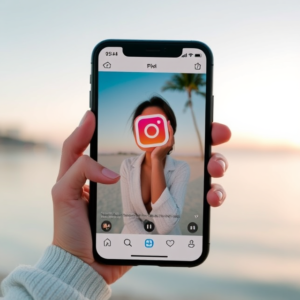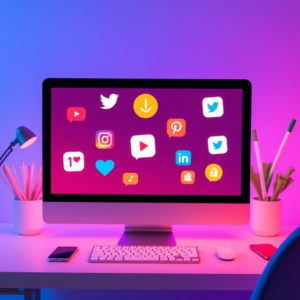TikTok, owned by the Chinese tech company ByteDance, has grown exponentially since its launch in 2016. It has become one of the most popular social media platforms worldwide, attracting millions of active users, especially in the U.S. While TikTok is beloved for its engaging short-form videos, it has faced serious concerns about user privacy and national security.
U.S. government officials have raised alarms over TikTok’s potential to pose a security risk, particularly because of its Chinese ownership and the possibility that user data could be accessed by the Chinese government. These concerns have sparked debates in the U.S. about whether the app should be banned, especially given the significant amount of personal information TikTok collects.
Overview of TikTok’s Popularity in the U.S.
TikTok’s popularity in the U.S. is undeniable. The app has more than 100 million active users, making it one of the top social media platforms in the country. Its user base is predominantly young, with teens and young adults making up a large portion of its audience. TikTok has had a massive impact on digital culture, influencing trends, music, and even political discourse. From viral dance challenges to educational content, the app has redefined how people engage with entertainment and information.
TikTok’s algorithm is another key factor behind its success. It tailors content to each user’s preferences, ensuring that they are constantly engaged with new and relevant videos. This personalized experience has made TikTok an addictive platform, drawing users to spend hours scrolling through content. The app also provides a platform for creators to build large followings, giving rise to influencers and celebrities who have leveraged TikTok to grow their personal brands.
Why TikTok Faces a Potential Ban
The primary concern about TikTok is its connection to China. U.S. lawmakers and security officials worry that the Chinese government could potentially gain access to the vast amounts of personal data TikTok collects from its users. TikTok gathers information such as location data, browsing history, and user preferences, which critics argue could be used for surveillance or to influence public opinion. Although TikTok has repeatedly denied these allegations and claimed that it stores data in the U.S. and other countries, many remain skeptical.
Another concern is the potential for the Chinese government to use TikTok for propaganda purposes. Given China’s strict control over its technology companies, there is a fear that TikTok could be used as a tool for spreading misinformation or influencing political opinions, particularly during times of national importance, such as elections. Some experts argue that because of its influence, TikTok could be used to manipulate public sentiment and even sway political outcomes.
In response to these concerns, the U.S. government has proposed various measures, including the possibility of a full ban on the app. While some states have already banned TikTok on government-issued devices, there have been broader discussions about implementing nationwide regulations or even forcing ByteDance to sell its U.S. operations to a U.S.-based company. Despite these efforts, TikTok has continued to grow in popularity, and its future in the U.S. remains uncertain as the debate over its risks and benefits continues.
Key Reasons Behind a Possible TikTok Ban
National Security Concerns and Data Privacy Issues
A major concern behind the potential TikTok ban revolves around national security and data privacy. U.S. lawmakers have raised alarms that TikTok could be a tool for the Chinese government to gather sensitive information on American citizens. The app collects a wide range of data, including location information, browsing habits, and even facial recognition data. While TikTok has stated that user data is stored in countries like the U.S. and Singapore, critics argue that it is still vulnerable to Chinese government influence due to ByteDance’s ownership. This has led to fears that personal data could be accessed, misused, or exploited for surveillance.
Political Tensions Between the U.S. and China
Political tensions between the U.S. and China have further fueled the debate around TikTok. The app, owned by the Chinese tech company ByteDance, has become a symbol of broader geopolitical struggles. The U.S. government sees TikTok as a potential instrument for Chinese influence, fearing that the app could be used to spread propaganda or manipulate public opinion, particularly during critical times like elections. Given China’s tight control over its domestic tech companies, U.S. officials worry that TikTok could be used to advance Chinese interests in ways that undermine American values or security.
Pressure on ByteDance to Divest TikTok’s U.S. Operations
Amid growing concerns, the U.S. government has pressured ByteDance to sell off TikTok’s U.S. operations to a U.S.-based company. Lawmakers believe that if TikTok’s operations were no longer under Chinese ownership, it would reduce the risk of the app being used for espionage or data collection by the Chinese government. ByteDance has faced mounting pressure to divest TikTok, but the company has resisted, arguing that selling TikTok would not address the underlying security concerns. Despite this, the U.S. government continues to push for a sale or other measures to protect national security.
Timeline of Events Leading to a Potential Ban
Previous Attempts to Ban TikTok in the U.S.
The debate over banning TikTok in the U.S. began in 2019, when concerns about national security first emerged. Lawmakers were worried that TikTok, owned by the Chinese company ByteDance, could pose risks to user data and privacy. The Trump administration led efforts to address these concerns, with President Donald Trump signing an executive order in 2020 that attempted to ban TikTok unless ByteDance sold its U.S. operations to an American company. The order cited national security risks related to the app’s data collection practices and potential access by the Chinese government.
In response, TikTok filed lawsuits against the executive order, arguing that it violated free speech rights and failed to provide evidence of a security threat. The legal battles stretched into 2021, with the Biden administration inheriting the situation. Instead of moving forward with the ban, President Joe Biden ordered a review of the national security risks posed by TikTok, leading to ongoing investigations and talks over how to address the issue.
Current Legislation and Debates in 2025
As of 2025, the debate over TikTok’s future in the U.S. continues to intensify. Legislation targeting TikTok is gaining traction, with bipartisan support for measures that would restrict the app’s use on government devices and potentially ban it from the broader public. Lawmakers are focusing on data privacy and the potential risks associated with TikTok’s Chinese ownership, arguing that the app could be exploited for surveillance or influence operations.
In 2025, the U.S. government is considering more aggressive steps, including enforcing stronger regulations on data storage and data sharing practices. Some proposals involve requiring TikTok to sell its U.S. operations or even to be banned outright if security measures are not met. TikTok has also faced increased scrutiny from federal agencies and state governments, many of which have already banned the app on government-issued devices due to privacy concerns. Additionally, the continued tension between the U.S. and China over trade, technology, and global influence is making it more difficult for TikTok to avoid the spotlight.
Despite the growing pressure, TikTok continues to argue that it has implemented measures to protect U.S. user data and ensure transparency. The company has announced plans to store data in local servers and limit access by Chinese employees, but skepticism remains high. The ongoing political tension between the U.S. and China continues to fuel the debate, with the outcome of TikTok’s status in the U.S. still uncertain.
Donald Trump’s Involvement in TikTok’s Fate
Trump’s Past Actions Against TikTok
Former President Donald Trump played a crucial role in the early efforts to ban TikTok in the U.S. His administration expressed strong concerns over the app’s potential risks to national security, particularly regarding its Chinese ownership and the possibility that user data could be accessed by the Chinese government. In 2020, Trump signed an executive order attempting to ban TikTok unless its U.S. operations were sold to an American company. This move was framed as a response to the perceived national security threat posed by TikTok’s data collection practices. The administration pushed for a forced sale of TikTok’s U.S. business to companies like Microsoft or Oracle, but legal challenges and delays ultimately prevented the ban from being fully implemented.
Trump’s administration argued that TikTok could be used by the Chinese government for espionage, surveillance, or propaganda purposes. The executive order was part of a broader strategy to limit the influence of Chinese companies in the U.S., particularly in the technology and social media sectors.
Could Trump Negotiate a Deal to Save TikTok?
While Donald Trump’s administration took aggressive steps to try to ban TikTok, it is unlikely that he could negotiate a deal to save the app in its current form, especially given the national security concerns that still exist. However, the possibility of a deal remains a topic of discussion, especially if TikTok were to restructure its operations in the U.S. to address the concerns raised by the government.
In 2025, with ongoing debates about TikTok’s future, it’s conceivable that negotiations could take place, but they would likely require significant concessions from TikTok. This might include a complete separation from its Chinese parent company, ByteDance, or a guarantee that U.S. user data would be fully stored and protected within the country. If TikTok were to meet these conditions, it could possibly avoid a complete ban. However, the complex political and security issues surrounding TikTok make it unlikely that any deal would come without significant scrutiny and regulation.
Implications of a TikTok Ban
How a Ban Could Affect U.S. Users and Creators
A potential TikTok ban would have significant consequences for U.S. users, especially those who have built large followings on the platform. Many young users, influencers, and creators rely on TikTok as their primary source of entertainment, self-expression, and income. With the app’s personalized algorithm, TikTok has allowed creators to reach wide audiences, leading to new opportunities in fields like music, fashion, and even activism. A ban would disrupt these creators’ ability to connect with their followers, potentially affecting their career opportunities and income streams.
For everyday users, the loss of TikTok would mean losing access to one of the most engaging platforms for entertainment and social interaction. Many people use TikTok to keep up with viral trends, discover new content, and engage with a global community. The removal of the app could create a void in social media experiences, as users look for alternative platforms to meet their needs.
Impact on Businesses Using TikTok for Marketing
TikTok has become a powerful tool for businesses to connect with consumers, especially younger demographics. Many companies use the platform to promote products, launch campaigns, and increase brand awareness. TikTok’s viral trends and the potential for content to go viral have made it a unique and cost-effective marketing platform. Businesses, particularly small and medium-sized enterprises, have been able to leverage TikTok to reach millions of people with relatively low budgets.
A ban would force these businesses to find new ways to market their products, potentially turning to other social media platforms like Instagram, YouTube, or Facebook. However, TikTok’s unique engagement model makes it difficult to replicate elsewhere, and businesses might struggle to find the same level of interaction with their target audiences. This disruption could affect sales, brand visibility, and the marketing strategies that many companies have come to rely on.
Global Reaction to a TikTok Ban
A TikTok ban in the U.S. would likely spark reactions from governments, businesses, and users around the world. Many countries, particularly those with significant TikTok user bases, may view a U.S. ban as an overreach or as part of broader geopolitical tensions between the U.S. and China. While some countries may follow the U.S.’s lead, others may see it as an opportunity to promote their own social media platforms or challenge the dominance of American tech companies.
From a global business perspective, a U.S. ban would also affect TikTok’s parent company, ByteDance, and could lead to financial losses or shifts in the company’s operations. Additionally, a ban could fuel discussions about the role of social media in international relations and the power of governments to control digital platforms. For users, a ban might mean a loss of access to one of the most popular social platforms in the world, forcing them to turn to alternatives like Instagram Reels, YouTube Shorts, or Snapchat.
Alternatives for TikTok Users
Other Social Media Platforms Gaining Popularity
If TikTok were to be banned, users and content creators would likely turn to alternative platforms that offer similar features. Several social media platforms are gaining popularity, and many of them have incorporated short-form video features similar to TikTok’s.
- Instagram Reels: Instagram’s short video format, Reels, has become a popular alternative to TikTok. With Instagram’s large user base and established creator community, Reels provides a familiar platform for users to continue sharing content and engaging with followers.
- YouTube Shorts: YouTube Shorts is another major competitor, offering a similar short-form video experience. Since YouTube already has a vast audience of video creators, it makes sense for many TikTok influencers to transition to this platform.
- Snapchat Spotlight: Snapchat introduced Spotlight to compete with TikTok’s short videos. While Snapchat’s focus is primarily on stories and private communication, Spotlight allows users to upload short-form content for a wider audience.
- Triller: Triller, often considered a TikTok rival, has gained attention as a potential alternative, with similar video editing tools and a focus on music-driven content.
These platforms are increasingly adding features and improving their algorithms to attract users who may seek a new home for their short-form videos.
Adapting to New Platforms for Content Creators
For TikTok creators, adapting to new platforms can be both an opportunity and a challenge. Creators who have built a following on TikTok might need to adjust their content style and strategies to fit different platforms. Here are some ways content creators can adapt:
- Learn the New Platform’s Features: Each platform has unique tools, algorithms, and content formats. Creators will need to familiarize themselves with features like Instagram Reels’ filters, YouTube Shorts’ integration with longer videos, or Snapchat’s more private sharing model.
- Cross-Promote on Multiple Platforms: Creators can share their content across several platforms to maximize their reach. For example, posting on both Instagram Reels and YouTube Shorts can help retain a similar audience while exploring new ones.
- Tailor Content to Audience Preferences: While TikTok was known for its fun, viral-style content, other platforms might have different user expectations. Creators may need to adjust their tone, style, or video length to match what works best on each platform.
- Monetization Opportunities: Different platforms offer different ways to earn money. Creators can explore options like brand partnerships, sponsorships, and ad revenue on platforms like YouTube or Instagram.
Adapting to new platforms might require some effort, but with the right strategy, content creators can maintain their audience and continue building their brand.
What TikTok Is Doing to Avoid a Ban
Efforts to Address Security Concerns
TikTok has taken several steps to address the security concerns raised by governments, particularly in the U.S. The platform’s efforts are focused on safeguarding user data and ensuring that it is not accessed by unauthorized parties, particularly the Chinese government.
- Data Localization: TikTok has committed to storing U.S. user data in local servers to address concerns about data privacy and surveillance. This move is aimed at ensuring that U.S. user data is protected from foreign influence and complies with local regulations.
- Project Texas: One of TikTok’s most significant initiatives to address national security concerns is “Project Texas.” Under this plan, the company has worked to implement stronger safeguards for U.S. data. This includes setting up data storage in the U.S. and hiring third-party companies to monitor and manage data access, including limiting access by Chinese employees.
- Independent Audits: TikTok has agreed to undergo regular audits of its data practices by external third parties. These audits are meant to ensure that the platform is adhering to its commitments regarding data security and transparency.
- Internal Review and Security Protocols: The company has made changes to its internal data access protocols to reduce the risk of misuse. TikTok has introduced new systems to monitor and track data access, ensuring that only authorized personnel have access to sensitive user data.
Partnerships and Transparency Initiatives
In an effort to gain the trust of lawmakers and users, TikTok has pursued several partnerships and transparency initiatives to demonstrate its commitment to data privacy and security.
- Partnerships with U.S. Companies: TikTok has partnered with major U.S. companies like Oracle to store and manage user data. These partnerships are designed to show that TikTok is committed to working with trusted, independent firms that comply with U.S. data protection standards.
- Transparency Center: TikTok has established a “Transparency Center” in the U.S., which is intended to provide independent oversight of its data practices. The center gives external experts access to TikTok’s data handling processes, helping to ensure transparency and address concerns about data access.
- Public Reporting: TikTok has promised to release more public reports detailing how user data is handled and how content is moderated. This transparency is meant to provide insights into how the platform operates and to ensure it aligns with local regulations.
- Content Moderation and Compliance with Local Laws: TikTok has made efforts to improve its content moderation practices to comply with U.S. laws. This includes addressing concerns about harmful content, misinformation, and political interference. TikTok has expanded its content moderation team to ensure compliance with U.S. laws and regulations, providing greater accountability.
How Users and Businesses Can Prepare
Steps to Back Up TikTok Content
If TikTok were to be banned or removed from app stores, users and businesses would need to have a plan in place to save and secure their content. Here are some steps to back up TikTok content:
- Download Videos: TikTok allows users to download their own videos directly from the app. Users should go through their content and download videos that are important to them. This can be done by tapping the three dots on a video and selecting the “Save Video” option.
- Use Third-Party Apps: There are third-party apps and tools that help users download all their TikTok content in bulk. These tools can be particularly helpful for creators who want to preserve a large collection of videos quickly and easily.
- Save Content to Cloud Services: Once content is downloaded, it’s a good idea to back it up on cloud services like Google Drive, iCloud, or Dropbox. This ensures that the content remains safe and accessible if TikTok is no longer available.
- Export Analytics and Insights: For businesses and creators who use TikTok’s analytics tools, it’s essential to export these insights for future reference. TikTok allows users to track performance metrics like views, engagement, and follower growth. Backing up this data can help creators understand their audience and continue their business strategies elsewhere.
- Save Collaborative Content: If users have collaborated with others on TikTok videos, it’s a good idea to reach out and ensure that all contributors save the content as well. This ensures that collaborative work isn’t lost in case of a ban.
Exploring Other Marketing Channels
For businesses relying heavily on TikTok for marketing, it’s essential to have a backup strategy in place to ensure continuity. Here’s how businesses can explore other marketing channels:
- Instagram Reels: Instagram has become one of the leading platforms for short-form video content. Businesses should consider using Instagram Reels to reach their audience in a similar way to TikTok. The platform’s large user base and integration with Instagram’s shopping features make it a solid alternative for product promotions.
- YouTube Shorts: YouTube Shorts offers another option for short-form video marketing. Given YouTube’s established audience and video platform dominance, businesses can leverage Shorts to drive engagement and reach potential customers with creative video content.
- Snapchat Spotlight: Snapchat’s Spotlight allows businesses to post short videos for a wide audience, making it another potential platform for marketing. Snapchat’s younger demographic can be particularly valuable for businesses targeting Gen Z.
- Pinterest Idea Pins: For businesses in industries like fashion, beauty, or home decor, Pinterest’s Idea Pins offer a unique opportunity for visual storytelling and product promotion. Pinterest’s algorithm focuses on inspiration and discovery, making it ideal for businesses looking to engage consumers through high-quality visuals.
- Facebook and Instagram Ads: In addition to organic content, businesses can utilize paid advertising on Facebook and Instagram to reach target audiences. Both platforms have highly developed advertising tools that allow businesses to run targeted campaigns based on user behavior and preferences.
- LinkedIn for B2B Marketing: For businesses targeting professionals or other companies, LinkedIn remains a crucial platform for B2B marketing. Sharing content, articles, and case studies can help businesses generate leads and enhance brand visibility within their industry.
Conclusion: Will TikTok Survive in the U.S.?
The Likelihood of a Ban in 2025
As of 2025, the future of TikTok in the U.S. remains uncertain. While there have been significant efforts to address security concerns and increase transparency, the geopolitical tensions between the U.S. and China continue to influence the platform’s status. A potential ban still looms, especially if TikTok fails to meet the security requirements set by lawmakers. However, TikTok’s strategies, including data localization, external audits, and transparency initiatives, have helped alleviate some concerns. Despite this, the political climate and national security worries suggest that the risk of a ban cannot be entirely ruled out.
TikTok’s fate will likely depend on ongoing negotiations, the platform’s ability to comply with U.S. regulations, and the broader political dynamics between the two countries. If the platform continues to implement safeguards and builds trust with lawmakers, it may avoid an outright ban, but the situation remains fluid.
Can Trump or Other Political Figures Influence TikTok’s Future?
Donald Trump, along with other political figures, has played a significant role in shaping the discourse around TikTok’s future in the U.S. During his presidency, Trump’s administration attempted to force a ban on TikTok due to national security concerns. While the Biden administration has adopted a more cautious approach, the influence of political leaders is still a critical factor in TikTok’s future.
Trump or other politicians could continue to push for stricter regulations or even advocate for a ban, especially if security concerns remain unresolved. However, the evolving political landscape, including the roles of key lawmakers, the regulatory environment, and TikTok’s efforts to address these concerns, will ultimately determine whether political figures can directly influence TikTok’s survival.
Ultimately, TikTok’s ability to navigate both political pressure and security concerns will be key to its future in the U.S. While the situation is tense, the platform’s efforts to improve transparency and security measures may help it maintain its presence in the country, despite political opposition.









